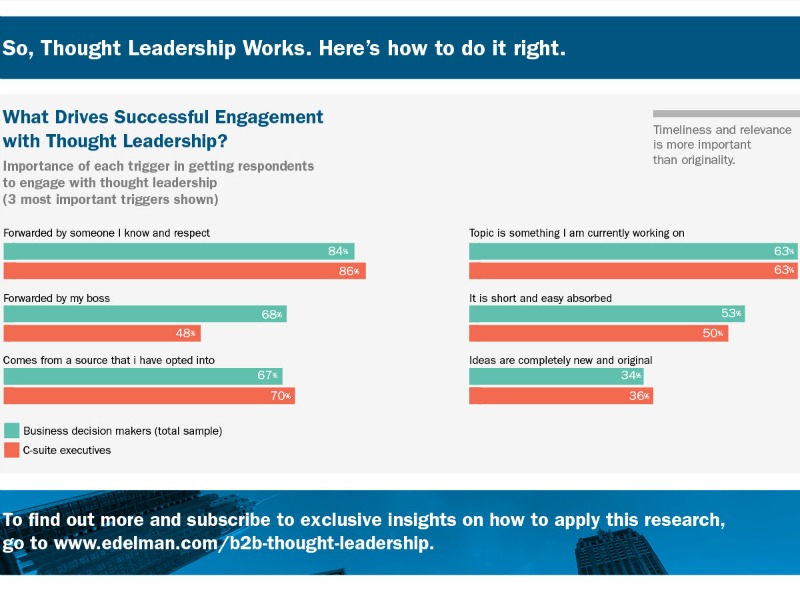Jade Eckardt 07 Jun 2017 // 10:03AM GMT

NEW YORK — Thought leadership content can significantly increase B2B business and boost revenues, according to a recent study by Edelman and LinkedIn.
However, the study also reveals that if not carefully crafted and executed, thought leadership can negatively impact the amount of business a firm is awarded.
"Earning the trust of customers is vital in the B2B buying process, where investments are large and the professional reputations of decision makers may be at stake," said Joe Kingsbury, US managing director, B2B, at Edelman. "The study points to a reality many marketers have struggled to quantify."
The study surveyed 1,300 business decision markers and C-suite execs conducted on LinkedIn from October through November, 2016.
Those surveyed said that 56% of the time, they don't gain valuable insights from the thought leadership they consume and it can remove a company from buyer consideration. Even so, decision makers (45%) and C-suite execs (48%) said a company's thought leadership content has directly led them to award business to a firm.
Decision makers (45%) and C-suite execs (53%) reported that thought leadership that wasn't high quality, insightful, or relevant could cause them to lose respect for a firm. It was revealed that marketers and communicators, who often create thought leadership, underestimate its influence at every stage of the B2B process.
The study also showed that only 17% of though leadership producing companies thought their content helped them get more RFP opportunities. Yet over twice as many decision makers (37%) an C-suite execs (47%) said an agency's thought leadership had directly affected their decision to invite a firm they hadn't previously considered to pitch against incumbents.
Characteristics of the most effective thought leadership were identified. It's more important for it to be relevant and timely than novel and original, according to 63% of those surveyed. Meanwhile, decision makers (78%) and C-suite execs (79%) said thought leadership must provide industry insights and nearly 75% said content must be digestible and focused on current industry topics. Over 80% agreed it must be from a trusted source or someone the recipient knows and respects.
"The ability to demonstrate valuable insights about trends and customer challenges is critical for engaging with senior executives and can lead to tangible, positive business outcomes," said Kingsbury.


































.jpg)




.tmb-135x100.jpg)












